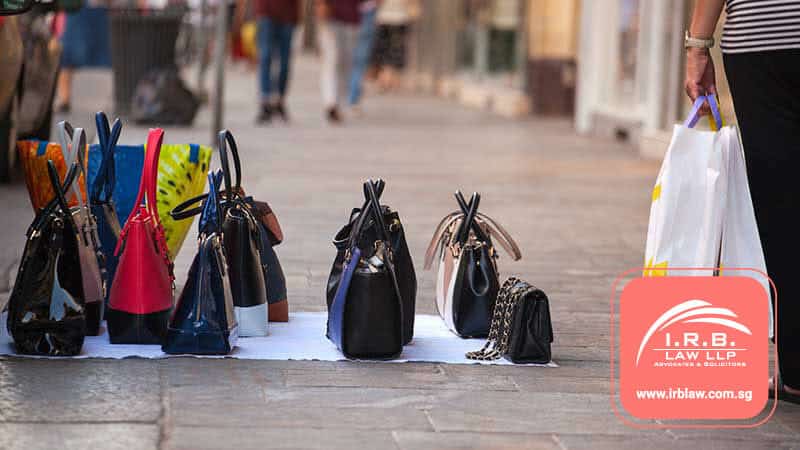They are produced in bulk, bear the name of a well-known brand, and attract a mass of customers – it all sounds like a dream. But what happens when reality catches up?
According to a 2016 study done by the Organisation for Economic Co-operation and Development (OECD), Singapore is the third biggest source of counterfeit and pirated goods. Cases, where sellers of counterfeit goods are caught, are not all that uncommon either; they happen in busy malls such as Far East Plaza (http://www.channelnewsasia.com/news/singapore/2-arrested-for-selling-counterfeit-luxury-goods-at-far-east-plaz-7570636) and even online (http://www.channelnewsasia.com/news/singapore/man-arrested-for-selling-counterfeit-goods-worth-s-53-000-9134252).
Essentially, selling imitation items is not worth the investment in the long run. Here is what you need to know about the law on counterfeit goods in Singapore.
What are counterfeit goods according to the law?
As set out in section 3 of the Trade Marks Act (Cap 332), counterfeit goods are anything that:
- Bears a brand name or label similar or identical to a registered trademark;
- Uses said brand name or label without the consent of the proprietor of the registered trademark;
- Is in itself similar or identical to products produced by the registered trademark; or
- Falsifies a genuine registered trademark (e.g. by changing it slightly).
Culpability can further be found where the seller or manufacturer is aware that the goods are counterfeit but continues to pass it off as the real deal.
What happens to sellers or importers of counterfeit goods?
If you are in the business of selling or importing various goods, you should verify that the goods you carry are not counterfeits, or you will be liable to charges under the Trade Marks Act (the ‘Act’).
Under section 31 of the Act, the proprietor of a registered trademark may sue a seller or manufacturer of counterfeit goods for damages. Additionally, section 53A of the Act allows police officers to arrest, without a warrant, anybody reasonably suspected of selling counterfeit goods.
Section 49 sets out the sale of counterfeit goods as an offence punishable by a fine of up to S$10,000.00 per counterfeit good, or up to five (5) years’ imprisonment, or both.
Importers should note that, under section 93A of the Act, customs officers have the right to detain, examine and confiscate goods reasonably suspected of being counterfeit.
What happens to the manufacturers?
As a manufacturer of counterfeit goods, you could face charges under sections 31 and 46 of the Trade Marks Act, just to name a few.
Section 31 allows the owner of a registered trademark to sue for any damages suffered as a result of the sale of counterfeit goods. On the other hand, section 46 sets out that a counterfeiter will be liable to a fine of up to S$100,000.00, or up to five (5) years’ imprisonment, or both.
Additionally, even if you just make an initial model to be reproduced by other manufacturers as a counterfeit good, you may face a charge under section 48 of the Trade Marks Act. There, it is stated that offenders who “an article specifically designed or adapted for making copies of a registered trademark” will be liable to a fine of up to S$100,000.00, or up to five (5) years’ imprisonment, or both.
What happens to buyers of counterfeit goods?
While you may not be liable to any charges under the Trade Marks Act so long as you do not trade or intend to trade, the counterfeit goods in your possession, your counterfeit goods may still be confiscated by authorities.
If you bring in counterfeit goods from overseas, customs officers have the right to stop you and confiscate the goods, if there is reasonable suspicion that the goods are counterfeit.
What if the copied trademark is not registered locally?
Where the registered trademark being copied is not registered domestically but abroad, the prosecution of counterfeiters can still happen in Singapore. To be prosecuted, however, the counterfeiters must be operating in Singapore.
There are agreements that protect well-known trademarks, whether they are registered domestically or not, and these agreements allow foreign brands to take action against sellers, importers and manufacturers of counterfeit goods in Singapore.
Examples of such agreements include the Trade-Related Aspects of Intellectual Property Rights (TRIPS) agreement and the Paris Convention for the Protection of Industrial Property.
What do sellers of counterfeit goods need to know?
It is tempting to make extra profit by selling attractive brand imitations at apparently affordable prices, but this is not a chance you should take. Even if you do not intend to sell counterfeit goods, but receive a supply of apparently branded goods at a suspiciously discounted rate, you should check your stock to ensure the goods are genuine.
Here is a non-exhaustive list of features that are easy to check:
- Any misspellings or grammatical errors on the packaging;
- Any consistent printing errors (e.g. faded colours);
- Lack of any symbols the particular brand usually uses (e.g. a special logo, a signature); and
- The serial number of products, where applicable.
If you receive a batch of what you suspect are counterfeit goods, do not sell any of them and proceed to file a police report. Provide as many details as possible on the supplier you received the goods from.
What do buyers of counterfeit goods need to know?
To avoid getting involved in the offence of trading counterfeit goods and having items you paid money for confiscated, you should be vigilant when shopping and eliminate the possibility of you buying counterfeit goods, whether by mistake or on purpose.
Refer to the above section, Advice to Sellers, for a non-exhaustive list of key giveaways on counterfeit items. As a guide, you should pay extra attention to branded goods that are selling at unusually low prices.
Should you have completed a transaction and received what you suspect to be a counterfeit good, keep all receipts and communications with the seller, where available. Have these, as well as details on the seller, on hand when you file a report with the police.
Consult a lawyer even if you have admitted to a crime
IRB Law Partner Muntaz Binte Zainuddin explains why you should always consider hiring a lawyer if you’ve admitted to a crime.





